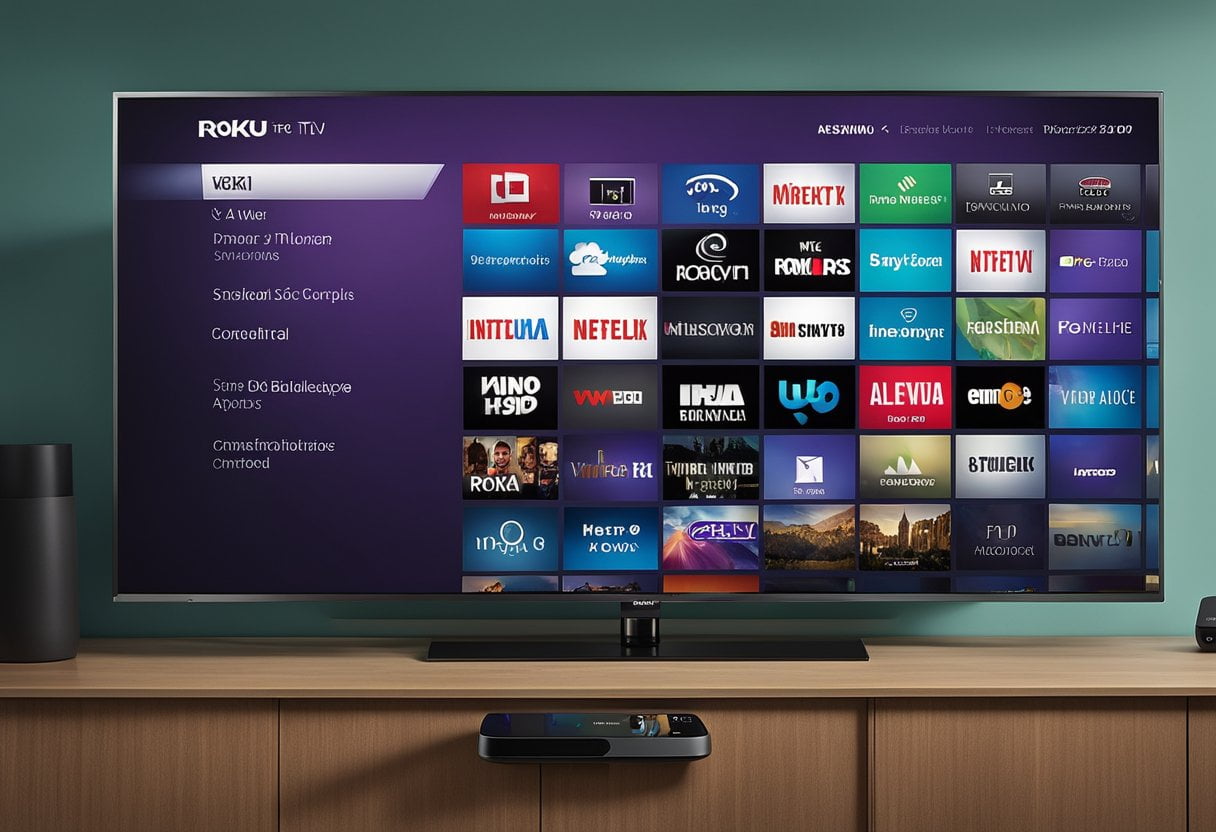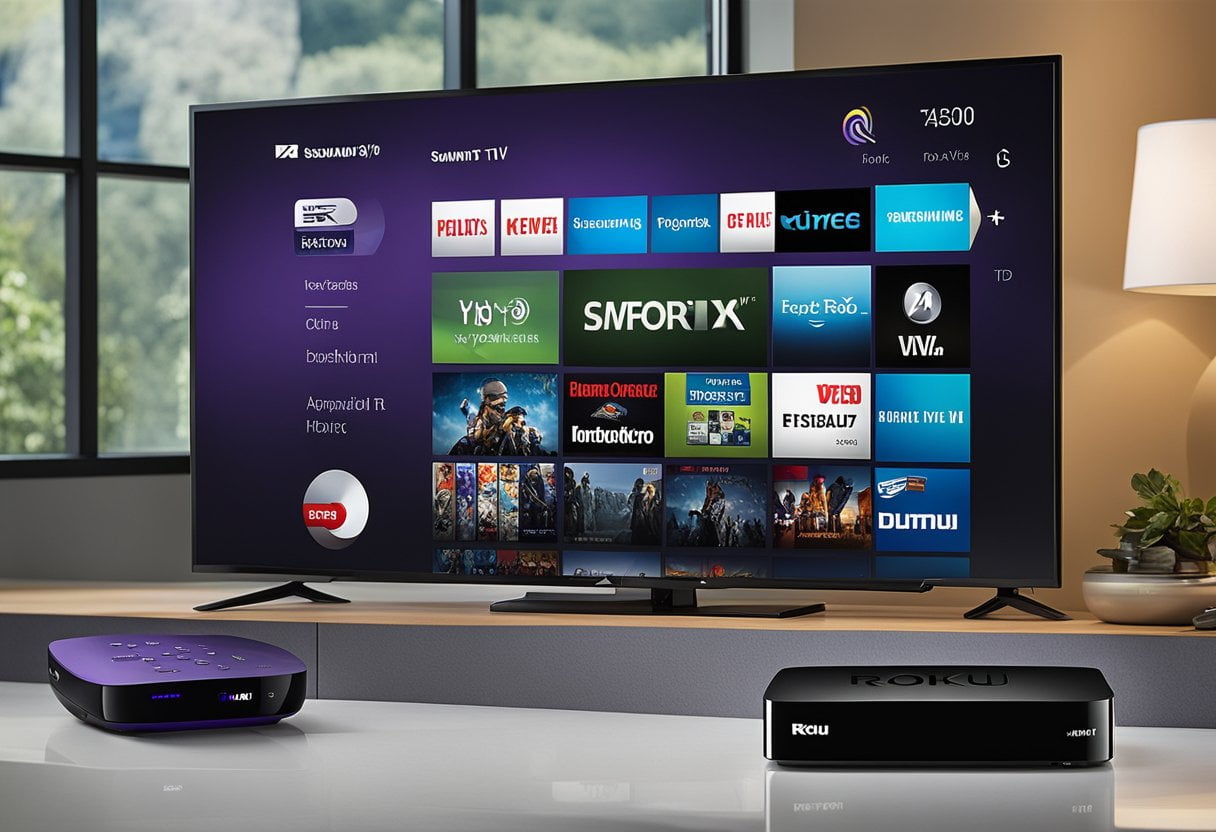Is Roku Better Than Samsung Smart TV? A Detailed Comparison
February 5, 2024Defining Smart TVs
Smart TVs are internet-connected televisions that allow users to access streaming services, browse the web, and run apps. They are designed to provide a more interactive and personalized viewing experience than traditional televisions. Smart TVs have built-in Wi-Fi, which enables them to connect to the internet and stream content directly from online services like Netflix, Hulu, and Amazon Prime Video.
Roku and Samsung Brand History
Roku is a company that specializes in streaming devices and smart TVs. It was founded in 2002 and has since become one of the leading providers of streaming devices in the market. Roku has partnered with several TV manufacturers to create Roku TVs, which are smart TVs that run on the Roku operating system. Roku TVs offer an affordable alternative to other smart TVs in the market, with a range of models to choose from.
Samsung, on the other hand, is a well-known brand in the tech industry. It is a South Korean multinational conglomerate that produces a wide range of electronic devices, including smartphones, tablets, and TVs. Samsung has been in the TV business for several decades and has established itself as a leading provider of high-quality TVs. Samsung’s smart TVs are powered by the Tizen operating system, which allows users to access a wide range of apps and streaming services.
When it comes to choosing between Roku and Samsung smart TVs, it ultimately comes down to personal preference and budget. Roku TVs are generally more affordable than Samsung smart TVs, making them a great option for budget-conscious shoppers. Samsung smart TVs, on the other hand, offer a wider range of features and a more polished user interface. Both Roku and Samsung smart TVs offer a great viewing experience, with access to a wide range of streaming services and apps.
Key Features and Technologies
When it comes to choosing between Roku and Samsung Smart TV, it is important to consider the key features and technologies that each platform offers. In this section, we will compare the operating systems, display technologies, and resolution and HDR capabilities of Roku and Samsung Smart TV.
Operating Systems: Roku OS vs Tizen
Roku OS is a user-friendly operating system that is designed to make it easy for users to access their favorite content. It offers a simple and intuitive interface that allows users to navigate through their favorite apps and channels with ease. On the other hand, Samsung Smart TV uses Tizen, an operating system that is designed to offer a more personalized experience. It provides users with a range of customization options that allow them to tailor their viewing experience to their preferences.
Display Technologies: LED, QLED, and Mini-LED
Both Roku and Samsung Smart TV offer a range of display technologies, including LED, QLED, and Mini-LED. LED is the most basic display technology, and it is used in most budget-friendly TVs. QLED, on the other hand, is a more advanced technology that offers better contrast and color accuracy. Mini-LED is a new technology that is starting to gain popularity. It offers better contrast and brightness than QLED, making it ideal for watching movies and playing games.
Resolution and HDR Capabilities
When it comes to resolution and HDR capabilities, both Roku and Samsung Smart TV offer a range of options. Roku offers TVs with 4K and 8K resolution, while Samsung Smart TV offers TVs with 4K, 8K, and UHD resolution. Both platforms also support HDR, with Roku supporting Dolby Vision HDR and Samsung Smart TV supporting HDR10+.
Overall, both Roku and Samsung Smart TV offer a range of features and technologies that make them great options for watching your favorite content. The choice between the two will ultimately come down to personal preference and budget.
Content and App Ecosystem

When it comes to the content and app ecosystem, both Roku and Samsung Smart TV offer a wide range of options. However, there are some differences to consider.
Available Channels and Streaming Services
Roku has a vast selection of channels and streaming services, including popular options like Netflix, Amazon Prime Video, Hulu, and Disney Plus. Additionally, there are many free channels available on Roku, such as Pluto TV and The Roku Channel, which offer a variety of content without requiring a subscription.
Samsung Smart TV also offers a range of popular streaming services, including Netflix, Amazon Prime Video, and Hulu. However, it is worth noting that Samsung Smart TV does not currently support Disney Plus.
Smart Home Integration and Voice Assistants
Both Roku and Samsung Smart TV offer integration with popular voice assistants like Amazon Alexa, Google Assistant, and Bixby. This allows users to control their TV using voice commands, such as changing the channel or adjusting the volume.
However, it is worth noting that the level of integration may vary depending on the device. For example, Roku devices offer more extensive integration with Amazon Alexa and Google Assistant compared to Samsung Smart TV.
Overall, both Roku and Samsung Smart TV offer a wide range of content and app options, as well as integration with popular voice assistants. However, the availability of specific channels and services may vary depending on the device.
Hardware and Connectivity
Comparing Roku and Samsung Device Offerings
When it comes to hardware, Roku offers a variety of devices to choose from, including the Roku Streaming Stick, Roku Express, and Roku Ultra. These devices come with different features and capabilities, allowing users to choose the one that best suits their needs and budget. On the other hand, Samsung Smart TVs come in a range of screen sizes and models, each with its own set of features and specifications.
While Roku devices are primarily set-top boxes that need to be connected to a TV, Samsung Smart TVs come with built-in streaming capabilities. This means that users do not need to purchase a separate device to access streaming services. However, this also means that users may need to upgrade their entire TV if they want to take advantage of new features or capabilities.
Connectivity Options and User Interface
Both Roku and Samsung Smart TVs offer a range of connectivity options, including HDMI ports and casting capabilities. However, Roku devices typically offer more HDMI ports than Samsung Smart TVs, which can be useful if users want to connect multiple devices to their TV.
In terms of user interface, Roku devices are known for their simple and intuitive design, with a focus on ease of use. Samsung Smart TVs also offer a user-friendly interface, with a range of customization options and features. However, some users may find the Samsung interface to be more complex or difficult to navigate than the Roku interface.
Overall, both Roku and Samsung Smart TVs offer a range of hardware and connectivity options, each with its own strengths and weaknesses. Users should consider their specific needs and preferences when deciding which device to purchase.
Price and Value Considerations

When comparing Roku and Samsung Smart TVs, one of the most important considerations is the price and value of each option. Here, we will evaluate the price points and budget options for both Roku and Samsung Smart TVs, as well as assess their long-term value and upgrade paths.
Evaluating Price Points and Budget Options
Roku TVs are often considered to be more affordable than Samsung Smart TVs, with a range of budget options available for those looking to save money. For example, the TCL 4-Series Roku TV is a popular budget option that offers a range of features at an affordable price point. Similarly, the Onn. Roku TV is a Walmart-exclusive option that is priced competitively for those on a budget.
Samsung Smart TVs, on the other hand, tend to be more expensive than Roku TVs, with prices varying depending on the model and features. However, Samsung does offer a range of budget options for those looking to save money, such as the Samsung TU8000 4K UHD Smart TV.
When evaluating price points and budget options, it’s important to consider the features and specifications that are most important to you. While Roku TVs may be more affordable overall, Samsung Smart TVs may offer better picture quality or more advanced features for those willing to spend a bit more.
Assessing Long-Term Value and Upgrade Paths
Another important consideration when evaluating the price and value of Roku and Samsung Smart TVs is their long-term value and upgrade paths. Both Roku and Samsung offer a range of subscription services and apps that can enhance the functionality of their respective TVs.
Roku offers a range of subscription services, such as Roku Channel and Roku TV Premium Subscriptions, which provide access to a range of streaming content. Samsung, on the other hand, offers its own subscription service, Samsung TV Plus, which provides access to a range of channels and content.
When it comes to upgrades, both Roku and Samsung Smart TVs offer a range of options for those looking to upgrade their TV. For example, Roku offers a range of Roku TV models with different features and specifications, allowing users to upgrade to a more advanced model as needed. Similarly, Samsung offers a range of Smart TV models with different features and specifications, as well as the ability to upgrade to a more advanced model in the future.
Ultimately, when evaluating the price and value of Roku and Samsung Smart TVs, it’s important to consider your budget, the features and specifications that are most important to you, and the long-term value and upgrade paths of each option. By doing so, you can make an informed decision that meets your needs and budget.
Frequently Asked Questions
What are the advantages of Roku TVs over Samsung Smart TVs?
Roku TVs offer a wide range of advantages over Samsung Smart TVs. One of the biggest advantages is that Roku TVs tend to be more affordable than Samsung Smart TVs. Roku TVs also offer a more user-friendly interface and a larger selection of streaming services than Samsung Smart TVs.
Can Roku streaming services provide a better experience than Samsung’s Smart Hub?
Roku streaming services can provide a better experience than Samsung’s Smart Hub in some cases. For example, Roku offers a larger selection of streaming services than Samsung’s Smart Hub. Additionally, Roku’s interface is generally considered to be more user-friendly than Samsung’s Smart Hub.
How does the cost-effectiveness of Roku TVs compare to Samsung Smart TVs?
Roku TVs are generally more cost-effective than Samsung Smart TVs. This is because Roku TVs tend to be more affordable than Samsung Smart TVs, while still offering a wide range of features and high-quality picture and sound.
Is the Roku platform more user-friendly than Samsung’s Tizen OS?
Many users find that the Roku platform is more user-friendly than Samsung’s Tizen OS. This is because Roku’s interface is designed to be intuitive and easy to navigate, while Samsung’s Tizen OS can be more complex and difficult to use.
What benefits do Samsung Smart TVs offer that Roku TVs do not?
Samsung Smart TVs offer a range of benefits that Roku TVs do not. For example, Samsung Smart TVs often offer better picture quality and more advanced features like voice control and facial recognition. Additionally, Samsung Smart TVs may be more compatible with other Samsung devices like smartphones and tablets.
Should I purchase a separate Roku device if I already own a Samsung Smart TV?
If you already own a Samsung Smart TV, you may still want to consider purchasing a separate Roku device. This is because Roku offers a larger selection of streaming services than Samsung’s Smart Hub, and its interface is generally considered to be more user-friendly. Additionally, Roku devices tend to be more affordable than Samsung Smart TVs, so purchasing a separate Roku device may be a cost-effective way to enhance your streaming experience.





